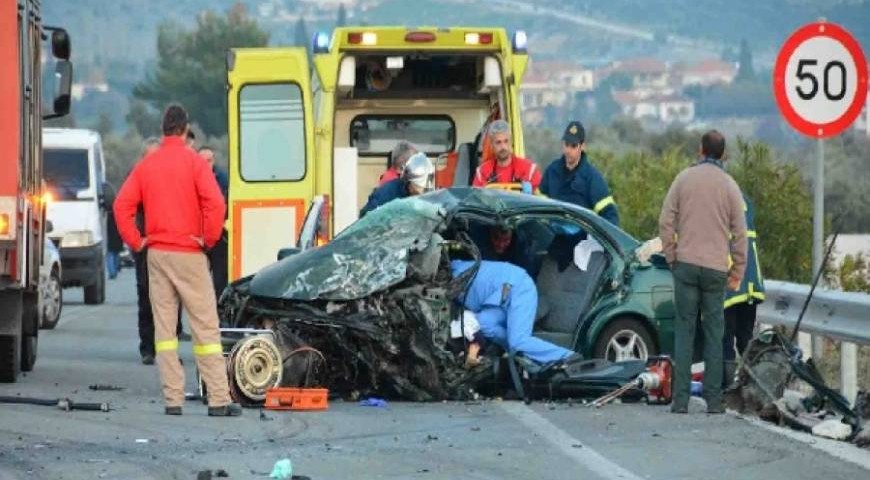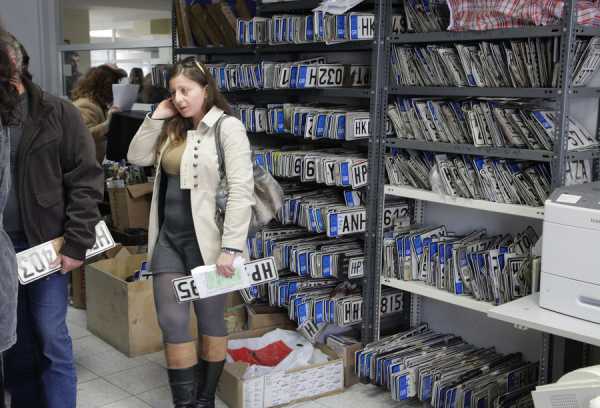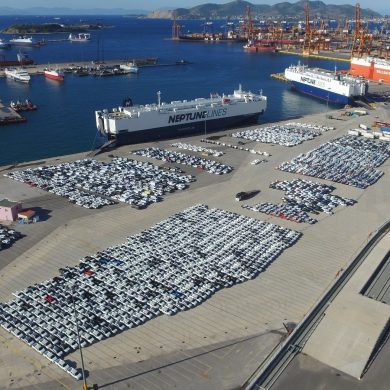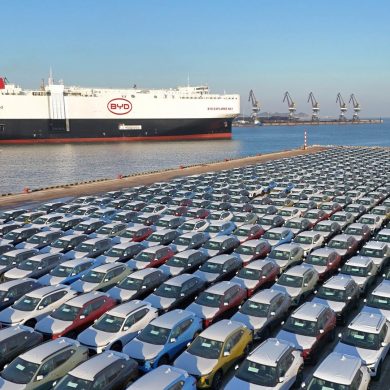 In this country, every time you leave your house, it's like playing Russian roulette. There are so many traffic accidents that you wonder: Are we at war? The answer is yes. Whose fault is it? Today we're going to blame the people we all love to hate: The politicians. And, on a taboo subject: Taxation.
In this country, every time you leave your house, it's like playing Russian roulette. There are so many traffic accidents that you wonder: Are we at war? The answer is yes. Whose fault is it? Today we're going to blame the people we all love to hate: The politicians. And, on a taboo subject: Taxation.
"Well," you'll say. "What does the tax on cars have to do with car accidents?" Why don't you spend a little time on the non-existent driving education of Greeks? With the roads - anecdotes, with driving licences sent by... registered mail after bribery? I've said it before and I'll say it again. But it's time to dissect a multiple crime that all governments have been doing over time.
Yes, the policy that has been followed in Greece in recent years with the over-taxation of cars is tantamount to a crime. Watch out: In the country with the highest number of road accident deaths in Europe, governments are essentially forcing people to have the smallest and oldest car possible.
Proof of this is the fact that the "fleet" of private vehicles is "ageing" rapidly - which means that values are also falling dramatically - as only one in 10 cars are less than five years old, while 56 out of 100 are 10 years old or more.
 As it is clear from the processing of the data of the Association of Automobile Dealers' Importers, the Memoranda have had a negative impact even on the age limit of cars.
As it is clear from the processing of the data of the Association of Automobile Dealers' Importers, the Memoranda have had a negative impact even on the age limit of cars.
Cars up to five years old barely account for 9% of all cars on Greek roads, while at the beginning of 2014, their share exceeded 14%. The reason is obvious: Since 2010, the replacement rate of old cars with new ones has plummeted.
Our cars, well, unfortunately they are old, because of the stupid mentality of governments (well, what can we do, they all have the same mentality) that car owners should be... punished. Instead of giving (real) incentives to buy new cars (usually, the newer, the safer and the less polluting), taxes, taxes, taxes are imposed on a people whose income has shrunk by 25% -according to Eurostat-. And, on the issue of the maintenance Greeks do on their cars, since there is no official data to draw safe conclusions, let me skip it.
Rough conclusion: Our "ethnopatriots", the politicians, don't care if we drive on dangerous roads in a jalopy. They only care about grabbing taxes today, as many as they can, as many as possible, to "present a project" today and, tomorrow, who lives who dies (not them, anyway).
The motorways
If "we travel with Harons cars" is considered an exaggeration (even though most Greek drivers are Harontes in person), we proved in a small way that we travel with old cars. Now let's look at where we travel, leaving aside the ridiculous goat roads of urban centers that have a coefficient of friction lower than oiled glass.
Greece has been building new national roads (for the last century). They are not yet completed, but, curiously, the citizens who use them have a world first: they pay tolls to pay a down payment for a road that WILL be built. And expensive tolls at that.
The 60 euros that a driver needs to pay only in tolls to go from Athens to Thessaloniki and... well, it's cheaper than an airline ticket and, in many cases, more than the amount of fuel a modern car needs. Thus, a huge percentage of professional and not only professional drivers are 'driven' to the old highway, where road safety is at a ridiculous level. The authorities have decided to take measures by banning certain types of vehicles and maintaining the road network, but it is too late.
Let's now go to the numbers: Cumulatively, traffic on the new highway has dropped by over 40% in the last five years. Given that a large part of the vehicles "lost" belong to professionals - the routes do not stop running - it is easy to understand why the number of accidents on the old highway has increased geometrically in recent years... Nor is it a coincidence that the reduction in traffic accidents (6.9% in ten years) in Greece is disproportionately small compared to the reduction in traffic volume. And, hold on to this: Since the spring of 2008, when the national road network was handed over to the contractors, the toll rates we pay have been increased by up to 180% to ensure revenue for the construction of roads that should have been completed by 2012, but in the most optimistic scenario, delivery is not expected before mid-2017.
Incidentally, according to the conclusions of a conference on road safety organised by the Association of Traffic Engineers and the National Technical University, the places where most road fatalities occur, the provincial and the rest of the national road network of the country, were left unmaintained from 2008 to 2015.
But let's look at a random year. In it, the traffic police recorded 747 fatal accidents across the country. 192 of these, occurred on the "other national road network" (i.e. the old highway) and another 226 on the "other road network" (i.e. side roads, country roads, etc.). That's 56% of the total fatalities...
Rightly so in the Region of Magnesia make event entitled no more victims in PEO Volos-Larissa ". The vice-regional transport Argyris Kopanas, says that "The toll is a modern scourge. It is an open wound to road safety! They turn motorways into secondary roads and side and secondary roads into a main network, since traffic is channelled there"!
And the losses
But the crime is the overcharging of cars and the industry in general and against the economy. It is losing billions of euros in jobs that are being lost, in road and registration taxes from cars that are immobilised, and even in the valuable VAT on their spare parts.
In Greece, 1 in 4 cars is "temporarily immobilised", since it has not paid taxes. And it does not pay because, on the one hand, the owner cannot afford the absurd amounts demanded (often the registration fees are higher than the value of the car) and, on the other hand, because he does not trust the financial staff of each government. The reason is simple. It is therefore logical that this, combined with the crisis and the ... lack of money, has caused stagnation in the car market.
In previous years, governments had given informal incentives for the purchase of large capacity cars and, as it was logical, Greece was full of SUVs (after all, with the... potholed road surface we have, it is not possible to drive a car other than a jeep). But, along with the "cherry" of the crisis, they were almost... criminalized, with absurd traffic taxes and luxury living taxes! The sequel was probably as expected: Cars with engines of over 2,000 cc (and more) were either put up for sale for a plate of lentils (most abroad) or were immobilised. Thus, in a year of the "facsimile idea" of hefty fees, 679,500 vehicle registration plates were filed in 2013, according to data from the KEPYO, accounting for more than 12% of all vehicles on the road. The government, that year, "hacked" the cars, with the aim of increasing the revenue from registration fees to 258 million euros, from 244, in the 12 months of 2012. All that this... scientific move achieved was to record a revenue shortfall of 132 million euros, (revenues fell to 126 million euros).
And once they saw that this policy was... dragging on, they continued it. In 2014, the number of license plate deposits exceeded 400,000, while according to data from the General Directorate of Taxes, at the beginning of 2015, 560,485 cars were at a standstill, while in the last three years alone (2012-2014) more than 55,000 vehicles have been exported. Earlier, another 80,000 had been exported. For cars of 2,000 cc, the ratio of cars in circulation to those temporarily immobilised was 3.7 to 1, while for cars of over 2,000 cc the ratio was 2.6 to 1.
It is also estimated that the revenue foregone from circulation taxes on cars in temporary immobilisation was in the order of €77 million and those exported in the order of €18 million.
In total, over the last six years, at least 1.2 million car owners have permanently surrendered their car registration plates. Do the math and think: If those who set the country's economic policy worked for a multinational corporation and their plan resulted in such a loss of revenue and "loss of customers," what would happen to them? And, what would the multinational do?






